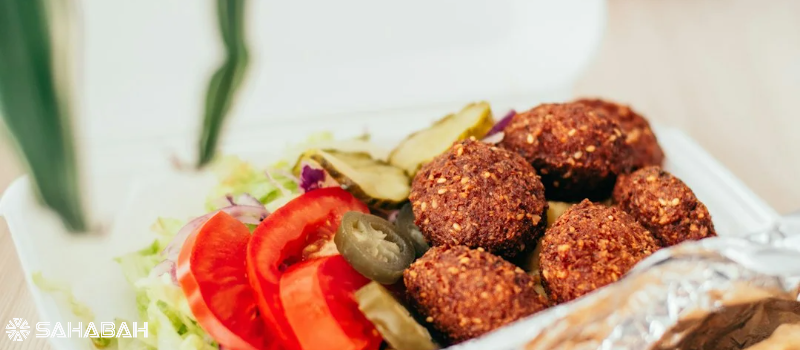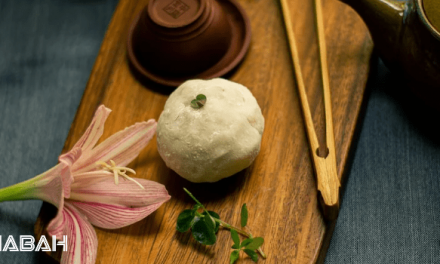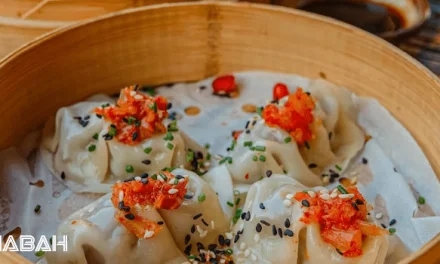Falafel is widely considered a halal food that adheres to Islamic dietary guidelines. But why would this popular Middle Eastern dish even be in question for Muslims? What exactly qualifies crispy, fried falafel balls and patties to be 100% permissible to eat under halal principles?
Let’s take a deeper, comprehensive look at what defines halal foods, the array of ingredients that comprise flavorful falafel, and how this snack meets the criteria to be classified as fully sanctioned as halal.
Defining Halal Food Standards in Islam
According to Islamic law recorded in the Quran, foods are strictly classified as either:
- Halal: Permissible and lawful to consume under Islamic dietary guidelines.
- Haram: Impermissible and unlawful to consume under Islamic principles.
Haram prohibited foods clearly spelled out in the Quran include pork and pork products, alcohol or other intoxicants, meat from animals that were incorrectly slaughtered, carnivorous animals, and any dishes containing questionable ingredients.
On the other hand, common food groups like fruits, vegetables, fish, seafood, properly slaughtered poultry and beef are always considered inherently halal. For these types of whole, unprocessed foods, no certification is required to confirm their permissibility.
However, in the case of more complex prepared dishes, certification organizations thoroughly assess the ingredients and preparation methods involved to determine if the food as a whole complies with halal standards. Some examples of dishes that require vetting before being deemed halal include:
- Sauces, soups and stews
- Mixed meals with multiple ingredients
- Processed or preserved items
- Fried foods
- Baked goods
- Ice creams and candies
- Ready meals
These composite foods must be reviewed to ensure no haram substances are used in either the core recipe or production process before they can officially be classified as certified halal.
Reasons Why Falafel’s Halal Status is Questioned by Some
At first glance, falafel seems to clearly align with halal criteria. The main ingredients used to make the fried balls and patties almost always consist of chickpeas (garbanzo beans), fava beans, onions, garlic, parsley, cilantro and common spices like cumin, coriander, black pepper and turmeric.
Since Islam expressly permits vegetables, herbs and spices, these constituents are undoubtedly halal on their own.
However, two aspects often cause Muslims to question whether falafel fully qualifies as 100% halal certified food:
Shared Cooking Oil with Potential Haram Contamination
The most common issue is that the oil used to fry and cook falafel could potentially be shared with non-halal foods. If the same fryers are also used to prepare haram products like pork sausage, bacon or pepperoni pizza, cross-contamination is possible:
- Traces of pig fat, meat or grease may transfer into the oil
- Microscopic particles may stick to the cooking surfaces and mix into other foods
So does this mean falafel cooked in possibly shared oil must be classified as haram?
Alcohol Content in Food Flavorings
Another point of contention is that some flavoring agents added to falafel batter may contain trace amounts leftover from the distillation processes of their organic material.
Spices, extracts, seasonings or other enhancers provide aromas and depth of taste. But minute remnants of the alcohol solvents used to derive them could still remain even after extensive processing.
Examples include vanilla extract, food-grade ethanol vinegar, certain citrus oils and some artificial colors or preservatives.
So can falafel containing possible alcohol residuals still qualify as halal?
Reasoning Behind Falafel’s Permissible Halal Designation
Despite these two concerns over shared oil and alcohol traces in flavorings, falafel still widely obtains formal halal certification by most major Islamic organizations.
This is because even with those factors, falafel is still largely considered aligned with the overall spirit and principles of halal guidelines when prepared properly.
Here is why it is an acceptable exception compared to other mixed foods containing clearly haram ingredients:
No Intoxicating Effects from Trace Alcohol
While tiny amounts of processing alcohols may remain in certain seasoning extracts, the high heat and extended frying time removes most of the impurities.
More importantly, these microscopic residuals have absolutely no intoxicating effect whatsoever on anyone consuming falafel. Therefore, most certification groups reason that this infinitesimal technicality does not actually violate halal integrity in practice.
Separate Fryer Oil Recommended But Not Always Feasible
Yes, using separate fryer oil that has only cooked confirmed halal ingredients is definitely ideal and preferred. But for many restaurants constantly frying a high volume and variety of menu items, separate systems may simply not be practical or economically viable.
Since falafel dough contains no actual haram components itself, most consumers do not consider occasional cross-contact from shared fryer oil to negate its permissible status. Just the possibility of traces is deemed acceptable.
Of course, more devout Muslims may personally avoid any questionable risk factors and choose not to eat non-certified falafel cooked in mixed oil. But from an official certification stance, these minority cases do not outweigh the authorization for the majority.
Positive Effects of Falafel’s Core Ingredients
Falafel’s base and bulk consists of protein-rich garbanzo beans, beneficial fresh parsley and herbs, chickpea flour, and vegetable oil.
These core elements provide positive nutrition and sustenance to support good health. As predominantly wholesome components that clearly meet halal criteria, this outweighs the relatively minor factors that could be considered incompatible according to stricter interpretations.
Given the balance of these considerations together, most certification authorities still give falafel the formal green light of approval to be classified as halal.
How to Ensure the Falafel You Eat is Certainly 100% Halal
While the majority of properly prepared falafel qualifies for halal designation according to most governing bodies, here are some proactive tips you can follow for reassurance:
Check Ingredients for Any Haram Components
Read the ingredient label of any packaged, pre-made or frozen falafel product you buy. Verify it does not list any alcohol, pork fat or derivatives, improper meat stocks or anything else expressly forbidden.
Seeing it in writing on the regulated packaging provides more confidence. If uncertain about any listed item, contact the manufacturer to ask.
Inquire How Restaurants Cook and Prepare It
Politely ask staff at any restaurant, food stall or takeaway shop you purchase falafel from how they actually make and cook it.
Inquire whether they exclusively fry it in designated vegetable oil without contamination from other meat, keep halal practices for all ingredients used, and can confirm no alcohols are ever included.
If they seem unsure or it is unavailable information, it may be wiser to eat elsewhere if you want guaranteed standards.
Buy Certified Pre-Made Brands If Possible
Seeking out pre-made falafel dough balls, patties or mixes that feature official Islamic halal symbols, logos and branding on the packaging provides maximum certainty.
Yes, these specialty certified lines may cost more than generic unlabeled brands. But for Muslims seeking to strictly uphold halal integrity, having approval seals from accredited organizations indicates adherence has been audited and verified.
Make Your Own Using Only Confirmed Halal Elements
Finally, you can prepare fresh falafel in your home kitchen ensuring it meets halal regulations by:
- Only frying it in oil from a sealed container solely designated for halal foods
- Sourcing ingredients like dried chickpeas, spices and flour from shops with halal suppliers
- Avoiding any flavor enhancers unless the composition is confirmed permissible
- Thoroughly cleaning all cooking equipment and surfaces to prevent cross-contamination
Following strict self-imposed protocols results in homemade falafel that satisfies even conservative halal dietary preferences.
Yes, Enjoy Flavorful Falafel as a Permissible Halal Delight
From its nutritious base of ground garbanzo beans to its palette of earthy spices and herbs like cumin, coriander and parsley, properly prepared falafel fully aligns with Islamic halal food requirements according to overseeing certification groups.
The rare possibility of traces from shared fryer oil or low-level alcohol residuals are mitigating reasonings that keep falafel safely in the permissible category for most practices.
Only the most staunch adherents or those with certain medically necessary restrictions tend to avoid questionable instances. For the predominant majority, crispy falafel balls and stuffed pitas can be enjoyed freely with confidence they qualify among other lawful halal cuisine.
So next time a craving strikes for hot, aromatic falafel served in soft warm pita bread and topped with cooling cucumber salad, savory tahini sauce and a bright purple drizzle of tangy-sweet amba, indulge away!
Frequently Asked Questions: Is Falafel Halal?
Yes, falafels are generally considered halal as they are made from plant-based ingredients and are not derived from non-halal animals or by-products.
What are falafels made of?
Falafels are typically made from chickpeas or fava beans, along with ingredients such as onion, parsley, garlic, salt, and various spices like cumin and coriander.
Where can I find halal falafels?
You can find halal falafels at Middle Eastern restaurants, halal food stores, or specific restaurants that specialize in serving halal cuisine.
How can I make falafels at home?
You can make falafels at home by mashing chickpeas, mixing in spices and herbs, forming them into patties, and frying or baking them until golden brown.
What are some common toppings or sauces served with falafels?
Falafels are often served with tahini sauce, hummus, tzatziki, or a spicy harissa sauce, along with chopped vegetables and pickles.
Do falafels contain any animal products?
Traditional falafels are plant-based and do not contain any animal products, making them suitable for vegetarians and vegans.
What makes falafels a popular dish?
Falafels are popular due to their delicious flavor, versatility, and the fact that they are a great protein option for those seeking a meatless meal.
Are falafels typically served as a part of a larger meal?
Yes, falafels are commonly served as part of a larger meal, often accompanied by pita bread, salad, and other Mediterranean dishes.
Where did falafels originate?
Falafels are believed to have originated in the Middle East, with their exact place of origin being a topic of debate among food historians.
Is it common to dine at restaurants that serve falafels?
Yes, falafels are a popular choice at Middle Eastern and Mediterranean restaurants, as well as casual and quick-service eateries that offer a variety of dishes.





